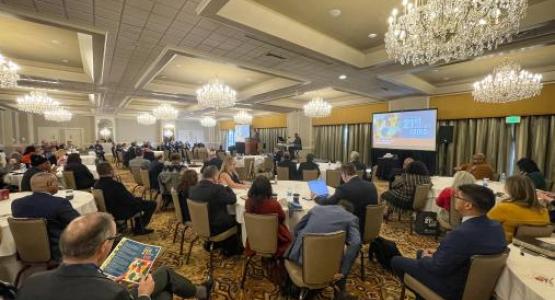
Ministering in the 21st Century: Leadership Conferences Tackles Tough Topics
Story by Ricardo Bacchus
Society is undergoing rapid technological advancements, globalization and cultural shifts. Individuals living in the 21st century are adapting and developing new ways of thinking and approaching the various complex- ities of modern life. Should the church be adapting too?
To tackle these subject matters, in late February, the Columbia Union Conference
held a leadership conference in Hershey, Pa., themed “Reaching the 21st Century Mind.” Attendees included representation of top officials from all eight conferences within the Columbia Union, two health care organizations and Washington Adventist University.
“Traditionally, [church members] see postmodernism as the enemy,” said Daniel Duda, president of the Trans-European Division and one of the speakers. But, like technology, it provides both good and bad and gives options that wouldn’t have been available otherwise. He posed the question, “Would people really choose to live 200 years ago if they could?” He explained, “If you underestimate secularism, it is going to kill your faith.” The antidote, he said, is to “work on your relationship with God” and look for ministry opportunities.
Duda added, “When you see ‘the others’ as an enemy you need to conquer, you aren’t going to reach them. God put great diversity into creation,” and people have different spiritual gifts. He continued, “When we work together, we are stronger, better off ... everybody has a role to play ... and can contribute to the body of Christ.”
Throughout the weekend, presenters tackled issues that are challenging to believers—ones that don’t always have clear-cut answers. “We don’t discover truth unless we ask questions,” posed Dave Weigley, Columbia Union Conference president at the time of the event.
Jiří Moskala, dean of the Seventh-day Adventist Theological Seminary (Mich.), said we need to remember that every person was made in the image of God while holding our theology of sin. “This is very difficult, very challenging.”
He pointed out that the mind of those living in the 21st century— Christians and non-Christians alike—have the tendency to question the gospel. Satan uses violence, intrigue and power to trick us. God, instead, uses love, kindness and generosity to use us to reach others.
“What are one’s motives for serving God?” Moskala asked, “to receive blessings from God or out of love?” He compared Job’s trials to ours, and that these tribulations in life provide us with something to draw on as we wit- ness to others. How we go about dealing with these difficulties shows others how much faith and dependence we have in God.
Presenters also shared medical and theological perspectives on human sexuality, human genetics and the Sabbath. The topics created a robust discussion as pan- elists and participants grappled with these important concepts.

Add new comment